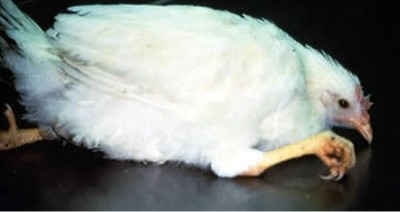Dealing with Marek's Disease in Chickens
Amy Barkley, Team Leader & Livestock Specialist
Southwest New York Dairy, Livestock and Field Crops Program

Dealing with Marek's Disease in Chickens
Marek's Disease is one of the most common flock illnesses. It is economically devastating for unvaccinated commercial flocks, and emotionally tough for small flock owners with unvaccinated flocks. However, with attention to flock health and vaccination of new arrivals, it can be easily managed.
What is Marek's Disease?
This disease is caused by a herpesvirus, which results in cancer at some point over the bird's life. It does not transmit to people, but can easily transfer from bird-to-bird. Once a bird becomes infected, it remains infected for life. There is no cure. Younger birds are affected more severely than older birds.
What are the signs?
Marek's most often shows up as leg weakness or stumbling, which ends up in paralysis. The lack of feed and water consumption, and/or cancer cells overwhelming the body, result in death. However, there are other symptoms such as cavernous feather follicles, where the follicles are too large for the feathers. Other birds may show what's called "cancer eye", where one pupil becomes permanently constricted. Upon necropsy, some birds show enlarged peripheral nerves (vagus, brachial, and sciatic). Necropsy can also reveal that some birds' body cavities are riddled with tumors. Any of these signs, especially when they show up across multiple, unvaccinated birds in the flock, can be indicative of the disease, but should be confirmed by a veterinarian through necropsy and testing.
How do birds get it?
The disease moves through infective feather dust that is inhaled by susceptible birds. The dander can be infective for many years. It's almost impossible to clean and disinfect to the point of eliminating it from the henhouse. If you keep chickens, poultry dust is everywhere and can be found on farm implements, equipment, other animals, clothing, and hands. Because of how ubiquitous it is, it can re-enter a cleaned premise easily. Remember that all birds in a flock with Marek's are infected, and even if they don't show signs, they are spreading infected dander.
Can I prevent it?
The only preventative measure is to vaccinate chicks within a day of hatch. Administering vaccine after this time is ineffective. Most hatcheries provide the vaccination for less than $0.50/chick, and it's cheap insurance to ensure that your flock lives a long, healthy life. There are also a limited number of farm supply companies that sell Marek's vaccine to vaccinate day-old chicks at home, but this is typically not cost-effective for most poultry owners, and the potential for error caused by improper storage and administration is high.
That said, the vaccine does not stop the infection. Rather, it limits the damage that the infection will cause the flock. Birds that are vaccinated and exposed to the virus will still get the virus, and still shed the virus, but will live long lives. Any newly vaccinated chicks should be kept away from the main flock for two weeks to allow their immune systems to develop and stave off the infection. Additionally, once the virus is found on a property, all new birds coming in will need to be vaccinated unless there is a at least a one year rest period following depopulation, cleaning, and disinfection.
For questions on flock health and management, reach out to Amy Barkley, Livestock Specialist, at (716) 640-0844 or amb544@cornell.edu.
Cover photo of paralyzed White Leghorn pullet by Dr. Jean Sander
This information is for educational and reference purposes only and is not a substitute for sound legal counsel, qualified tax preparation or accounting, and/or appropriate veterinary care. Please always read an follow pesticide and medication labels and instructions.
Cornell Cooperative Extension is dedicated to providing research-based information to our agricultural producers. Every effort has been made to provide correct, complete, and up-to-date recommendations. Changes occur constantly and human errors are possible.
Upcoming Events
Boots in the Barn: Cornell Dairy Research Updates
January 13, 2026
January 20, 2026
January 27, 2026
February 3, 2026
February 10, 2026
February 17, 2026
February 24, 2026
Join us for some or all!
Deerworm and Flukes in Small Ruminants Webinar
February 25, 2026 : Deerworm and Flukes in Small Ruminants Webinar
Dr. Mary Smith from Cornell's College of Veterinary Medicine and Dr. Rachel White from UMaine Cooperative Extension will be discussing the lifecycles, signs, prevention, and management of deerworm and liver flukes in small ruminants.
NYSDEC How to Get Certified Course
March 3, 2026 : NYSDEC How to Get Certified Course
Ellicottville, NY
NYSDEC training course in preparation to take the pesticide applicator exam.
Announcements
Cows, Crops & Critters Newsletter Sponsorship
TRYING TO REACH GROWERS AND AGRIBUSINESSES IN OUR SOUTHWEST REGION OF NEW YORK?Weekly Email Update: Shared with 625+ households who have signed up with our program.
Monthly Paper Mailer: To reach our stakeholders and farmers who lack internet access, we send out a monthly mailer where your company's logo and contact information would be featured with a mailing list of 330+ households.
If you sponsor our weekly and monthly publications you reach approximately 955 households.





